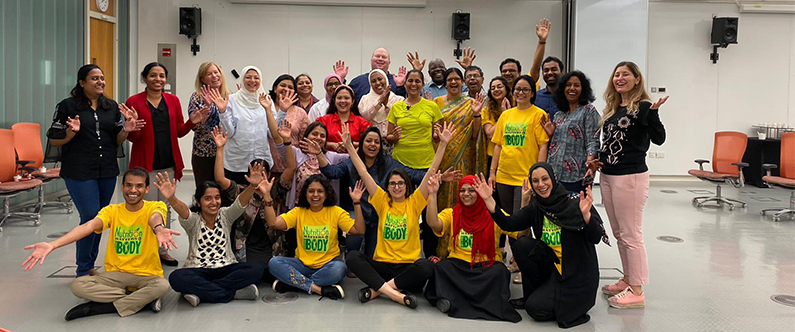WCM-Q hosts a week-long event dedicated to lifestyle medicine
 The week was organised by staff from the Institute for Population Health.
The week was organised by staff from the Institute for Population Health.
Staff, faculty and students from Weill Cornell Medicine – Qatar (WCM-Q) and across Qatar Foundation had the chance to learn more about healthy lifestyles when the college hosted its second annual Lifestyle Medicine Week.
The event is organized by WCM-Q’s Institute for Population Health and involves a whole week’s worth of activities centered on what the individual can do to take responsibility for their own wellbeing.
This year there were sessions on quitting smoking and other addictive substances, a fun team-based trivia quiz to improve connectedness, and a workshop on the power of laughter and yoga to help one relax and relieve stress.

The ever-popular Walk for Life was held at Qatar Foundation’s Oxygen Park, and once again demonstrated the ease in which everyone can engage in moderate exercise for at least thirty minutes a day.
New for this year was the Cornell Super Chef competition, which saw teams battle it out to make the best salad using a variety of different salad leaves, vegetables, nuts, oils and vinegars. The idea behind the competition was to encourage individuals to focus on plant-based food and focus on consuming real natural food as opposed to processed food.
Nicola Adair, chief of staff in the Dean’s Office at WCM-Q, was one of the judges.
She said: “It was such a fun event and so interesting to see how many different tastes and flavor combinations could be achieved using very similar ingredients. It certainly provided food for thought about how many more options there are to eat healthily.”
Dr. Ravinder Mamtani, vice dean for student affairs-admissions, population health, and lifestyle medicine, said that Lifestyle Medicine Week was developed because of the increasing knowledge that the majority of human illnesses and diseases can be prevented, controlled and in some cases cured by making sensible lifestyle choices. Obesity, diabetes, heart disease, high blood pressure and some cancers often have their roots in poor diets, a lack of exercise or use of substances like tobacco, and studies have shown that some diseases like type-2 diabetes can be reversed in certain cases if the sufferer adheres to a strictly controlled diet.
Dr. Sohaila Cheema, director of the Institute for Population Health, said it had been an entertaining and informative week. Dr. Cheema said: “The aim was to empower and inform the Education City community about the need for making good lifestyle choices. Due to the busyness and stress in our lives, it is easy to fall into bad habits and it is good to be reminded how healthy changes, no matter how small, in our habits can ensure that we stay fit and healthy, both for ourselves and our families. We must, therefore, create time in our lives to make those changes.”